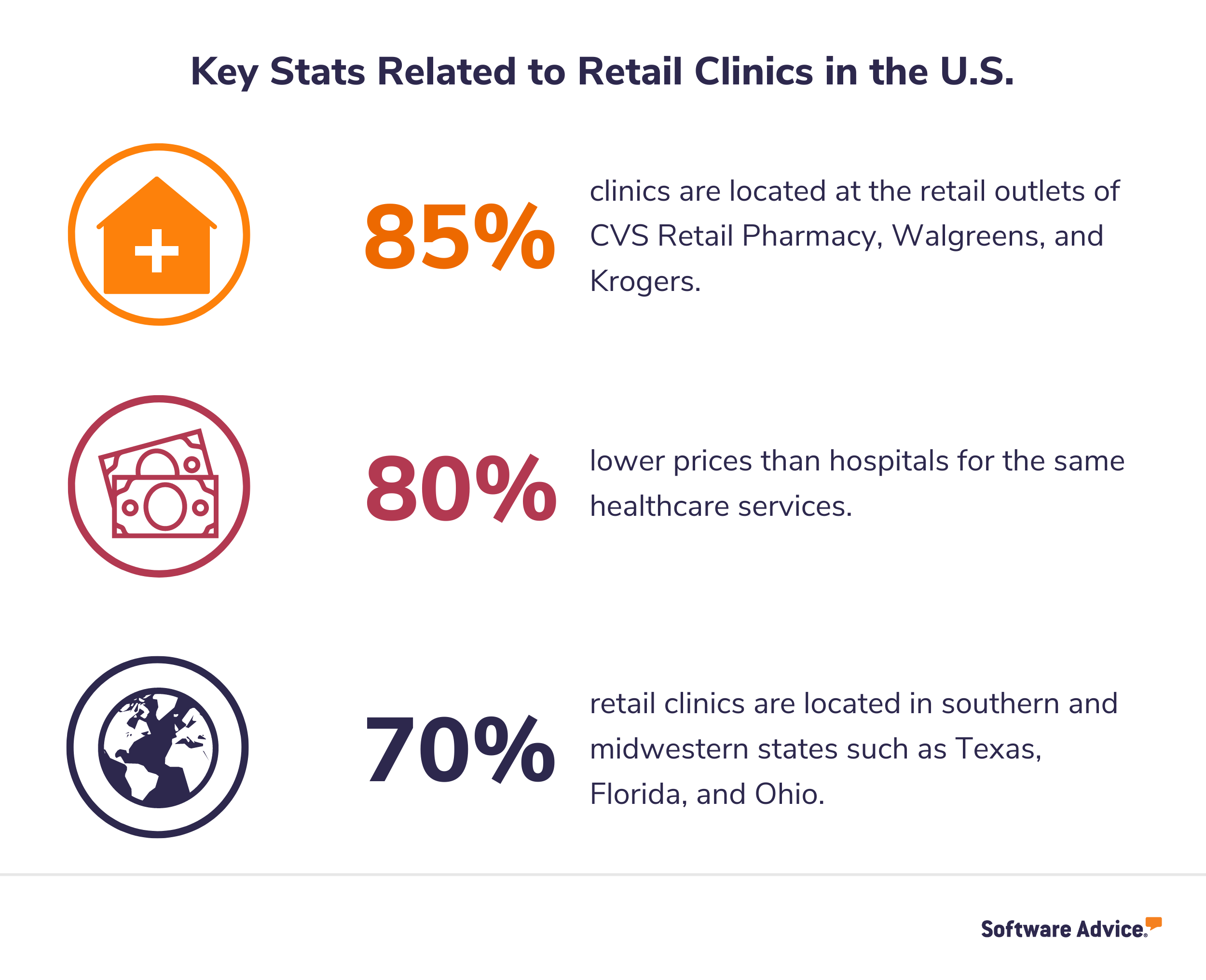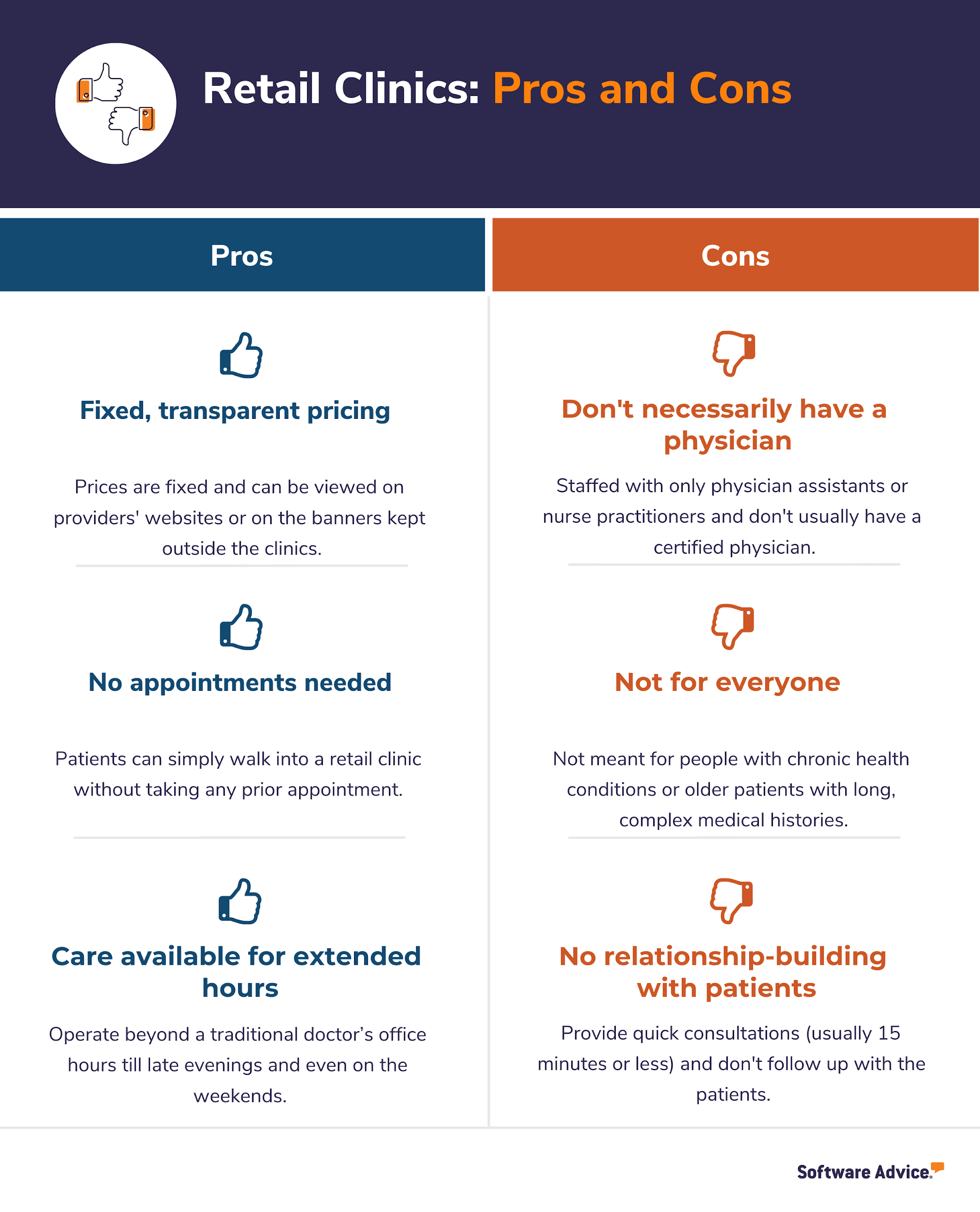What Is a Retail Clinic? Here’s Everything You Need To Know
According to the U.S. Census Bureau, around 26.1 million Americans—i.e., almost 8% of the U.S. population—didn’t have health insurance at any point during 2019. For people in this bracket, healthcare is an out-of-pocket cost that can even turn into a large medical debt. These people want low-cost healthcare services that don’t require insurance, and retail clinics offer one such option.
Retail clinics are located inside retail outlets such as supermarkets or department stores and offer more affordable healthcare than other medical facilities. If you run an independent or group practice, you may be interested in knowing more about retail clinics, especially because they’re giving tough competition to medical practices like yours.
In this article, we answer several questions related to retail clinics: Who owns them, how do they operate, what services do they offer, and how are they different from urgent care centers? We also provide recommendations on how to manage competition with retail clinics.
Here’s what we’ll cover:
Pros and cons of retail clinics
Difference between a retail clinic and an urgent care center
Next steps: How to compete with retail clinics
What is a retail clinic?
A retail clinic is a walk-in clinic located at retail outlets such as grocery stores, department stores, malls, and supermarkets. People can visit these clinics without making an appointment. Hence, they’re suitable for patients who need immediate treatment or those who don’t wish to go through the hassles of making an appointment with their primary care physician.
Retail clinics have a shorter wait time than most primary care centers or hospitals, so patients can get in and out faster without having to wait in long queues at the physician office. But these clinics are meant to treat only common ailments, such as sore throat, cold, and flu, and aren’t equipped to handle emergency care or chronic conditions.
Here are some interesting stats about retail clinics in the U.S.: Prices in retail clinics are almost 80% lower compared to hospitals, and the majority of clinics in the U.S. operate in southern and midwestern states such as Texas, Florida, and Ohio. CVS Retail Pharmacy, Walgreens, and Krogers are the top retail clinic operators in the country, and almost 85% of clinics are located at outlets belonging to these three retail clinic companies (as of January 2019).

Pros and cons of retail clinics
Retail clinics provide affordable, quick healthcare to patients without coverage, but they also have certain drawbacks. Here’s a comparison of the advantages and disadvantages of retail healthcare clinics.

Recommended action: If any patient you treat visits a retail clinic due to urgency or your unavailability, get complete details of the visit to prevent any gaps in care. Ask about the type of treatment they received, and update the same on your records.
Difference between a retail clinic and an urgent care center
It’s easy to get confused between a retail health clinic and an urgent care center, mainly because both offer similar services and patients can walk into both without any prior appointment. For example, patients can get COVID-19 tests done at both facilities.
The key difference is: Urgent care centers have more advanced clinical capabilities than retail clinics. For instance, they’re equipped with X-ray imaging equipment to manage patient injuries. Also, unlike retail health clinics, most urgent care centers have at least one certified physician on call for patients visiting the emergency room.
Below is a tentative list of conditions and illnesses treated at retail clinics vs. urgent care centers. Key point: An urgent care clinic can treat all the conditions treated at a retail clinic, but its main purpose is to offer emergency care.
Retail clinics | Urgent care centers |
Sore throat | Fractures and sprains |
Cold | Whiplashes |
Flu | Cuts and lacerations that need stitches |
Allergies | Mild-to-moderate difficulty in breathing |
Cuts | Heart attacks and chest pains |
Burns | Injury from a fall or car accident |
Rashes | Urinary tract infections (UTIs) |
Headaches | Poisoning or drug overdose |
Strains and sprains | Allergies and asthma |
Bronchitis | Diarrhea and vomiting |
Sinus infections | Pink eye |
Samples for blood work | Ear infection |
Health screenings for work or school | Strep and sore throat |
Vaccinations | Rash and itching |
Physical exams | Coughing and sneezing |
Other preventative care | Minor abdominal pain |
Next steps: How to compete with retail clinics
There’s no doubt retail clinics are an affordable option for people who don’t have insurance. But these clinics are giving serious competition to independent and private medical practices like yours. The quick, affordable services they offer are attracting many patients, even those with coverage, and potentially disrupting the patient-physician relationship.
Here are a few ways you can manage competition from retail clinics:
Extend your normal business hours. Most patients that make a retail clinic visit do so due to the unavailability of their primary care physician or family physician.
Offer competitive prices for minor injuries or illnesses. Try matching the prices offered by retail clinics.
Make the appointment scheduling process easier for patients by providing them self-service capabilities. Use patient scheduling software, appointment reminder software, or patient portal software to let patients schedule or reschedule appointments on their own.
Offer telemedicine services to diagnose and treat patients remotely over video calls, live chats, phones, etc. Telehealth services increase patients’ access to medical care as well as reduce healthcare costs for physicians like you.
Educate your patients about the benefits of one-on-one primary care over quick-service retail clinics.
Planning to buy software to keep your patients coming back?
We’ll help you find the right software for your needs and budget in 15 min. or less, for free. Schedule a call, or click here to chat with a software advisor now.